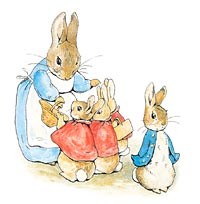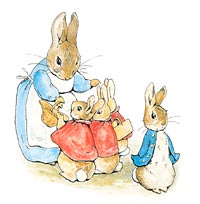What goes around, they say, comes around — or, in this case, hops about in a blue waistcoat, munching stolen radishes. Our subject today is no visionary CEO, but Peter Rabbit, probably the best-known creation of children’s author Beatrix Potter.

Peter, ever the rebel.
The World of Beatrix Potter™
© Frederick Warne & Co., 1902; 2002.
By turning the spotlight in Peter’s direction, we hope to illuminate some lessons in the game of responsible global branding. You see, SustainAbility has been called in to advise Frederick Warne & Co. — a division of Penguin Books, which owns the Peter Rabbit brand — as the wayward rabbit makes inroads on the global lettuce patch. It seems the brainchild of a Victorian English lady has become a hit in, among other places, the Land of the Rising Sun.
Why is Japan so taken with Peter and his pals? Part of the answer is that Potter’s stories are rooted in a highly romanticized view of nature. Another factor is the Japanese schoolgirl — or, more specifically, her love of kawairashii, cuteness. Perhaps, too, there is an even more important factor in a world where English has become the lingua franca: Potter has huge appeal in Japanese classrooms because her language is simple and her sentences short. (You never know when you might want to explain veggie kleptomania when traveling.)
If Peter Rabbit hasn’t yet bounded onto your radar screen, he soon will, thanks to Renée Zellweger and Ewan McGregor. Since it really is about time those two appeared in this column — even if our mailbags are not groaning with letters protesting the oversight — we note that they are working on a bio-pic on the life and times of Potter, currently being shot on location on the Isle of Man.
So what happens when a local brand like Peter Rabbit explodes onto the global stage? The issues may differ considerably from those faced by other current or recent clients of ours — among them Coca-Cola, Nike, Starbucks, and Unilever — but this bunny business still presents several useful lessons.
A $500 Million Sideshow
The first lesson of going global is an old one: think local, or even better multi-local. Not all lettuce patches are the same. If the English are inclined to embrace rabbitkind, for example, across the Channel the French prefer their lapins simmering in the stewpot. A world away, the Australians — well, Australian views on rabbits aren’t for polite company. In short, you must know your own story well enough to be prepared for surprises. Can you predict how your corporate culture, product, and brand will be received in different places?
If your answer is “with open arms, of course,” then pay attention to the second lesson: prepare for the problems of transcultural success. Today, thousands of Japanese tourists pour into Potter’s adopted county of Cumbria each year. In the process, they contribute something like 5 percent of the county’s tourist income. On average, we are told, these visitors — spurred on by the national addiction to gift-giving, or o-mayage — buy 12 Beatrix Potter T-shirts and 20 fridge magnets. So many visitors turn up that the National Trust — which runs Hill Top Farm, where Potter once lived — has instituted a daily limit on tours.
Unless it is a complete dud, the new film can only make the National Trust’s problems worse. While Zellweger and McGregor would no doubt make fine magnets, it’s more likely that the spotlight will be on the likes of Mrs. Tiggy-Winkle, Jemima Puddle-duck, and the increasingly ubiquitous Peter. Which brings us to the third lesson: be very conscious of whom you’re ultimately selling to. In this case, almost all Peter Rabbit-branded products go to children. That might make embracing sustainability more natural a step than it would be for, say, Boeing or General Dynamics. In fact, it presents a good model; the whole point of the sustainability agenda is that all companies should act as if they were selling their wares to the folks who will inherit whatever we choose to leave them. And as companies like Johnson & Johnson have long understood, selling to children, or to those caring for or giving to children, is a very different game.
Not that Potter herself would have had any concerns about selling to children. As her books began to sell by the wheelbarrow-load, then the wagon-load, she proved much more commercially adept than one might imagine. It’s clear that she saw the commercial opportunities attached to her art. Among other things, she patented a Peter Rabbit doll and devised branded games, puzzles, and wallpaper. Although Potter described these ventures as “sideshows,” today’s versions have taken off, with annual retail sales now valued at around $500 million — a business well worth protecting.
Which brings us to the fourth lesson: what starts out “soft” can harden quickly. Let us explain. Many companies operating in hard-nosed, highly competitive industries still see corporate citizenship as soft, discretionary. But many consumer brands now know different. When they come under challenge or attack on ethical, social, or environmental issues, such companies can shift to new priorities surprisingly quickly — and those priorities can then cascade through value chains. In today’s increasingly interlinked global economy, even the hardest-nosed companies sometimes prove surprisingly sensitive to sustained pressure — think Wal-Mart.
Penguin Books is at the softer end of the market, and would seem unlikely to be called out on the carpet. But the company has had a few PR problems in its long history — among them being tried for obscenity in the infamous Lady Chatterley’s Lover case in 1960 and being caught up in the fatwa against author Salman Rushdie. In the end, the company was found not guilty in the Chatterley case, and the Rushdie affair has simmered down — but it is hardly surprising that the iconic publisher is now a little gun-shy, even where fictional rabbits are concerned. Companies like Penguin are becoming acutely aware that corporate responsibility issues proliferate faster than rabbits in the wild. And they have also seen that even well-run companies can get caught out in the most extraordinary ways, as the impact of the Islamic boycotts on Danish industry has shown.
This brings us to the fifth lesson for brand owners: there really is no time like the present to think through how to sidestep potential future problems. Because in today’s nanosecond markets, the media are on a sensitive hair-trigger — even more than poor, pest-plagued Mr. MacGregor.



